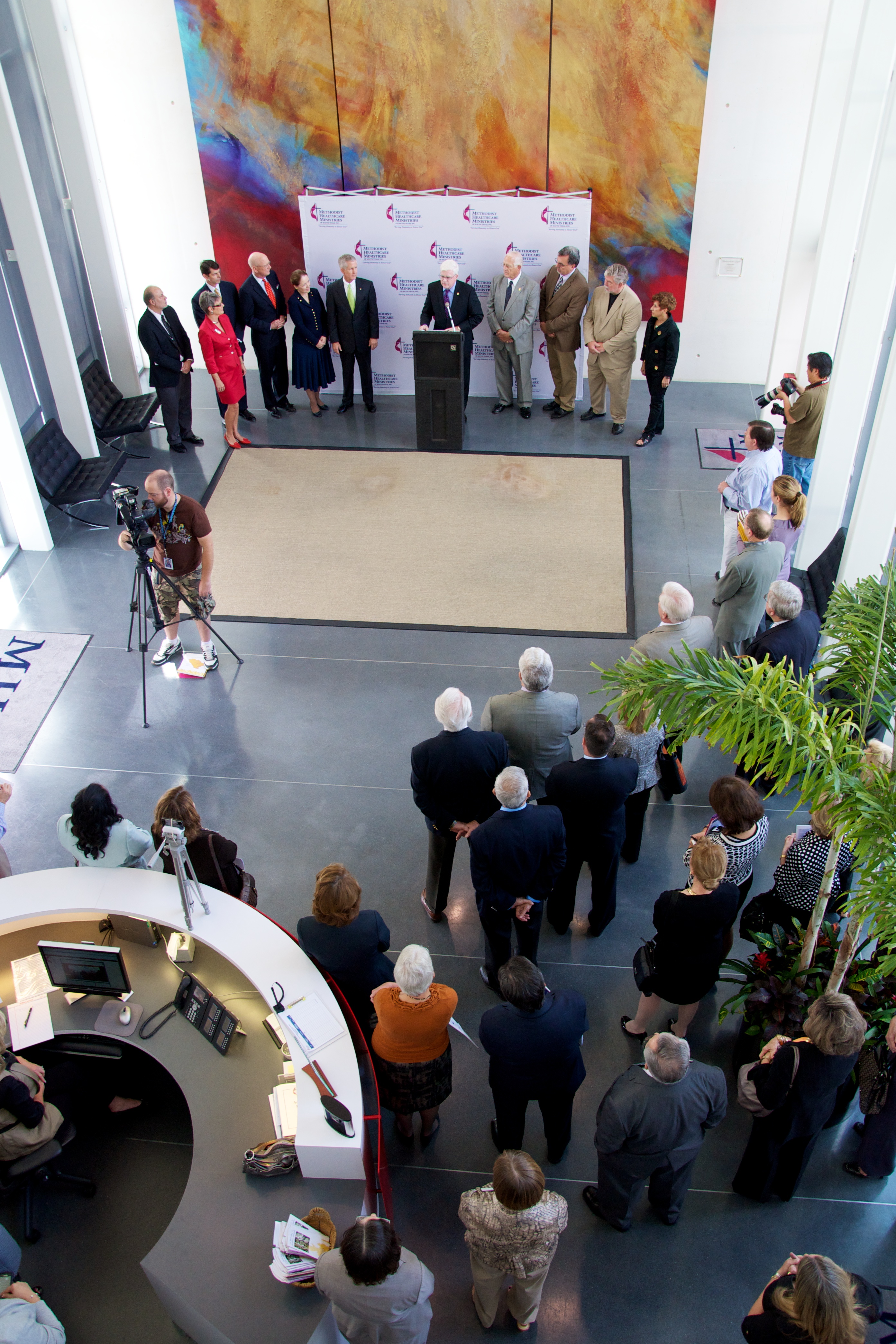Why the MHM Mental Health Initiative Matters
by Anne Connor
aconnor@mhm.org
San Antonio, like many cities in the United States, faces key gaps in mental health care: A fragmented “system,” with little coordination or collaboration among providers; few resources where the uninsured can receive mental health care in a timely manner; and a serious shortage of mental health providers. The $9.4 million funding initiative announced by Methodist Healthcare Ministries on October 12 was a coordinated response to those needs. The grants made by MHM will change the landscape of care in San Antonio, addressing system issues in a way that will benefit thousands of underserved mental health consumers.
Here’s why it matters:
- Hospital discharge is no longer abandonment. Previously, the fragmented mental health system of care in Bexar County did not have a way to care for mental health patients discharged from hospitals. This had gotten so bad that in 2009, bills were drafted trying to address “patient dumping.” In one high-profile case a woman, left at a bus station after being discharged from a mental hospital, died as a result. MHM’s grant to the University of Texas Health Science Center at San Antonio (UTHSCSA) includes funding for a Transitional Care Clinic. This clinic will link patients with care when referred from local ERs and inpatient programs. It will provide next day mental health appointments (almost unheard of in San Antonio) and 60-90 days of transitional care until the patient can be enrolled in existing community programs. The clinic will open in 2012 with a projected capacity of 550 psychiatric patient visits a month. An innovative feature is that care management and therapy will be delivered in the home or community, with patients coming to the clinic for medication management only. By providing 60-90 days of intensive coordinated care, the clinic will (a) decrease emergency visits and re-hospitalizations and (b) provide an inter-professional training venue.
- San Antonio will have more mental health providers. San Antonio has a lower mental health provider-to-population ratio than the national average, exacerbating other conditions to create a serious care shortage. Through MHM’s grant, UTHSCA will establish a multidisciplinary training and clinical care program, addressing the shortage of mental health professionals, with four new behavioral health training and practice programs. MHM’s total grant to UTHSCSA (for both the Transitional Care Clinic and the behavioral health training and practice programs) is $5.3 million.
- The mentally ill homeless will receive centrally located care. Prospects Courtyard, the “encampment” at Haven for Hope, is a temporary home for those homeless persons who are not ready to enter the Transformational Program at Haven, largely because of mental health issues. Haven for Hope is not currently equipped to deal with this situation. MHM’s million dollar grant to The Center for Health Care Services will fund a new Mental Health Clinic. This walk-in psychiatric outpatient clinic will serve homeless individuals: (a) living at the Courtyard, (b) living in a new dormitory residence (not funded by MHM), and/or (c) referred by community agencies. Services will include psychiatric assessments and follow-up, medication stabilization and monitoring, case management and rehabilitation, benefit procurement, and nursing assessments.
- Providers will work together to serve the whole client. Life is not simple, and mental illnesses do not occur in isolation. More often than not, they are accompanied by physical ailments and substance abuse issues. MHM’s $2.8 million grant to The Center for Health Care Services will fund the creation of two new integrated care clinics, in partnership with CentroMed. The program will launch at an existing location, the University Family Health Center Northwest, providing 24/7 access to care and wraparound services. The focus will be on those patients most in need of integrated care (especially high utilizers of emergency and hospitalization services). The second phase of the program will be a brand new clinic in the downtown corridor in Year two of the grant.
- Mental health rehabilitation will be more available. Not all mentally ill persons need hospitalization or crisis services. Many are stabilized through medication, and need a place where they can move from the feeling of being disabled (as a patient) to being able. Our House San Antonio is an important part of the mental health continuum of care in Bexar County. At a very low cost per client, it provides outpatient rehabilitation and prevention services for those with severe and persistent mental illness. The central model is prevention- rather than treatment-oriented, emphasizing healing and stabilization through a work-centered day and a return to a productive role in society. Services include “active reach out” to identify and address possible crisis situations when members do not show up to the Clubhouse. This program has been demonstrated to significantly reduce mental health hospitalizations. MHM is providing a $300K grant to Our House for capital renovations to a new building that will triple their ultimate capacity to serve clients.
The mental health strategic initiative, mandated by the Methodist Healthcare Ministries Board, was implemented through a year-long effort by a mental health work group convened by MHM. The work group identified key gaps in the system of mental health care and produced a report on the system of care in July 2011. The grants responded directly to that report.
The San Antonio Express-News also provided coverage on this announcement, to view the article click here.
About the Author:
Anne Connor has 14 years of experience in development and nonprofit management. She is a champion for collaborative work in philanthropy and among nonprofits, and for the use of outcome measurement to demonstrate how programs make a difference. She has been with Methodist Healthcare Ministries for nine years. Her team administers the grants made by MHM, and provides technical assistance to other organizations in seeking grants from foundations and government agencies. She coordinates the Texas Health Funders’ Consortium, organizing educational presentations on health topics (including mental health) and facilitating the co-funding of health grant projects.

